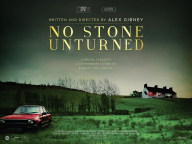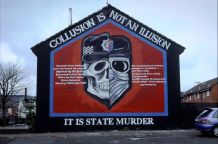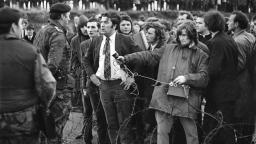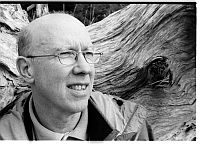Ciné Gael Montréal Irish Film Series 2019 ...our 27th
Concordia University, 1400 de Maisonneuve West, at 7:15 PM, unless otherwise indicated.
Our opening film of the season was Black '47 set in 1847, the worst year of the Great Famine which beset Ireland from 1845 to 1852. 72 years later, in January 1919, Ireland's first Dáil (An Chéad Dáil) was Dáil Éireann as it convened from 1919–1921. We're now 100 years on, and it's also the 100th anniversary of the formation of Ireland's Department of Foreign Affairs and Trade.
96 min - Dir: Lance Daly; with: Hugo Weaving, James Frecheville, Jim Broadbent, Stephen Rea, Freddie Fox, Barry Keoghan, Moe Dunford, and Sarah Greene
 "Lance Daly's Famine epic is an admirable attempt to go where no one has gone before"
"Lance Daly's Famine epic is an admirable attempt to go where no one has gone before"
"Black 47 succeeds magnificently in evoking the misery of the Famine while simultaneously treating us to a rattling adventure yarn."
"Stephen Rea is the heart and pulse of this film, playing Conneely, a cunning, clever western countryman
who hides his broken-hearted anger behind a crooked smile and mocks the English at every turn."
- The Independent [Paul Whitington]
 "A visually arresting, Anglo-Irish western-style revenge tale that maintains
a firm directorial grip on the foreboding landscape."
- Los AngelesLos Angeles TimesTimes [Michael Rechtshaffen]
"A visually arresting, Anglo-Irish western-style revenge tale that maintains
a firm directorial grip on the foreboding landscape."
- Los AngelesLos Angeles TimesTimes [Michael Rechtshaffen]
"That it all works as well as it does is as much a testament to the crackerjack cast
as it is to Daly's brooding, violently controlled direction."
- MovieFreak.com [Sara Michelle Fetters]
 Set in Ireland during the Great Famine, the film follows an Irish Ranger who has been fighting for the British Army abroad,
as he abandons his post to reunite with his family. The title is taken from the most devastating year of the famine, 1847,
which is referred to as Black '47.
Set in Ireland during the Great Famine, the film follows an Irish Ranger who has been fighting for the British Army abroad,
as he abandons his post to reunite with his family. The title is taken from the most devastating year of the famine, 1847,
which is referred to as Black '47.
Black '47 held its world premiere on 2 March 2018 at the Berlin Film Festival, before being released on 7 September 2018 in Ireland by Element Pictures. The film received positive reviews from critics, and was a box-office success in Ireland.
110 mins - Written and Directed by Academy Award-winning documentarian Alex Gibney
 "With signature relentlessness, Gibney doggedly pursues the story of an alleged cover-up and collusion
at the highest level of British police and governmental authority. His investigation should serve to bring
this quest for truth and justice closer to a conclusion."
IFI [Sunniva O'Flynn]
"With signature relentlessness, Gibney doggedly pursues the story of an alleged cover-up and collusion
at the highest level of British police and governmental authority. His investigation should serve to bring
this quest for truth and justice closer to a conclusion."
IFI [Sunniva O'Flynn]
“Scrupulously even-handed, the film explores collusion between police and paramilitaries and the decidedly unstable foundations underpinning the Northern Ireland peace process.” The Guardian [Wendy Ide]
One of cinema's most prolific and impactful documentary directors, Alex Gibney, is best known for tackling big stories of international significance: Enron, Scientology, clerical sex abuse, and Al Qaeda. Here, he narrows his focus to explore the 1994 Loughinisland Massacre in which six Catholic men were shot in a bar as they watched Ireland play in the World Cup.
 Although it was established that the killing had been carried out by the UVF and there seemed to be sufficient
evidence to bring the perpetrators promptly to justice, the investigation soon petered out as leads went unfollowed,
files were lost, and evidence destroyed.
IFI [Sunniva O'Flynn]
Although it was established that the killing had been carried out by the UVF and there seemed to be sufficient
evidence to bring the perpetrators promptly to justice, the investigation soon petered out as leads went unfollowed,
files were lost, and evidence destroyed.
IFI [Sunniva O'Flynn]
My feeling is that Gibney, though he's long been a wizard of documentary aesthetics, has only grown as a filmmaker. His 2014 film Mr. Dynamite: The Rise of James Brown was the grandest of his artist portraits, and Going Clear: Scientology and the Prison of Belief, which came out in 2015, was arguably his greatest achievement: the movie that peeled back every layer of the Scientology onion, and did so with the sinister bravura of a profound thriller.
 "All of which makes No Stone Unturned, which premiered today at the New York Film Festival,
a true Gibney anomaly. The movie is his investigation into the Loughinisland massacre, one of the signpost tragedies of
the conflict in Northern Ireland. It's the first Gibney film that has almost no connection to events happening in America -
but, ironically, it's also one of the only Gibney films in which he declares, right up front, his personal relationship to the subject:
He had spent time over in Ireland, working on a project that connected him to The Heights Bar, a small-town pub on an isolated road."
- Variety [Owen Gleiberman]
"All of which makes No Stone Unturned, which premiered today at the New York Film Festival,
a true Gibney anomaly. The movie is his investigation into the Loughinisland massacre, one of the signpost tragedies of
the conflict in Northern Ireland. It's the first Gibney film that has almost no connection to events happening in America -
but, ironically, it's also one of the only Gibney films in which he declares, right up front, his personal relationship to the subject:
He had spent time over in Ireland, working on a project that connected him to The Heights Bar, a small-town pub on an isolated road."
- Variety [Owen Gleiberman]
101 min - Dir: Carmel Winters with: Hazel Doupe, Dara Devaney, Johnny Collins, Hilda Fay, Lalor Roddy, Aidan O'Hare
 "In Ireland, to have a young female Irish Traveller at the centre of a film ... is unthinkable."
- TIFF [Michèle Maheu]
"In Ireland, to have a young female Irish Traveller at the centre of a film ... is unthinkable."
- TIFF [Michèle Maheu]
"An impressively passionate recreation of a now-distant era. Above all it is a triumph for Doupe,
who scraps and bawls and triumphs like a star from the golden age."
Float Like a Butterfly, an Irish film concerning a Traveller girl who idealises
Mohammad Ali, has won a major award at the Toronto International Film Festival.
The FIPRESCI Prize for the Discovery Programme is a major coup for any independent film.
"We couldn't have wished for an audience more open to opening their hearts," the Irish writer-director
Carmel Winters said on Sunday night at TIFF.
It has been an eventful week for the Cork woman.
At the screening on Friday afternoon, she told the audience that, just days earlier,
she had married her production designer Toma McCullim at Toronto City Hall.
- The Irish Times [Donald Clarke]
"A fabulous, organic mix of traditional Irish song, boxing and female emancipation." - Cineuropa [Kaleem Aftab]
In filmmaker Carmel Winters' second feature, a young Irish Traveller has to contend with her recently released from prison father in order to pursue her dreams of being a boxer and making her idol Muhammad Ali proud.
 Set in the 1960s, this rousing tale of filial love and personal freedom follows the fortunes of a young
Irish Traveller with a gift for pugilism. Encouraged from a tender age by her father's affection for Muhammad Ali,
Frances (Hazel Doupe, who imbues her character with arresting self-possession) has the fire and discipline
to be a great fighter - if only people could see past their narrow notions regarding her gender.
Set in the 1960s, this rousing tale of filial love and personal freedom follows the fortunes of a young
Irish Traveller with a gift for pugilism. Encouraged from a tender age by her father's affection for Muhammad Ali,
Frances (Hazel Doupe, who imbues her character with arresting self-possession) has the fire and discipline
to be a great fighter - if only people could see past their narrow notions regarding her gender.
Frances was still little when her mother died and her father, Michael (Dara Devaney), was incarcerated.
When Michael is released years later, he decides to pack up the caravan, take the kids, and go a-roaming.
Frances is by now a feisty adolescent ready to prove her grit in any ring that will take her,
 but along with Michael's troubling penchant for drink come old-fashioned macho attitudes,
such as the idea that boys should fight while girls are best off wedded and pregnant just as soon as womanhood looms.
Various altercations on the road as well as a ripe old grudge with a bigoted police officer provide
Frances with opportunity to prove her abilities. But will the otherwise loving Michael's sexist views allow her to shine?
but along with Michael's troubling penchant for drink come old-fashioned macho attitudes,
such as the idea that boys should fight while girls are best off wedded and pregnant just as soon as womanhood looms.
Various altercations on the road as well as a ripe old grudge with a bigoted police officer provide
Frances with opportunity to prove her abilities. But will the otherwise loving Michael's sexist views allow her to shine?
Written and directed by playwright and filmmaker Carmel Winters, Float Like a Butterfly offers both a universal story about a young person fulfilling their promise and a glimpse into a rarely seen milieu. - TIFF [Michèle Maheu]
93 min - Dir: Michael Fanning with: Sean O'Mainnin, Ronan Mac Con Iomaire, Marty Walsh, Pat Nee, John 'Red' Shea, Micky Ward
 "...this textured sporting underdog narrative is greatly enlivened
by the quality of its contributors, a cast that features the Boston Globe's Kevin Cullen, former mobster John 'Red' O'Shea,
anti-violence activist and author Michael Patrick MacDonald and mayor of Boston Marty Walsh."
The Irish Times [
Tara Brady]
"...this textured sporting underdog narrative is greatly enlivened
by the quality of its contributors, a cast that features the Boston Globe's Kevin Cullen, former mobster John 'Red' O'Shea,
anti-violence activist and author Michael Patrick MacDonald and mayor of Boston Marty Walsh."
The Irish Times [
Tara Brady]
"One doesn't need to be into pugilism or well-versed in Gaelic to appreciate "Rocky Ros Muc," a documentary that is as much about roots and identity as it is a portrait of Irish American boxer Sean Mannion." Los Angeles Times [ Michael Rechtshaffen]
 Seán Mannion was a granite-jawed welterweight / light-middleweight who fought out of Boston, Mass from 1977 until he finally retired in 1993.
Seán Mannion was a granite-jawed welterweight / light-middleweight who fought out of Boston, Mass from 1977 until he finally retired in 1993.
He boxed as an amateur in Ireland before taking the plane to Massachusetts to make his fortune, like so many before him.
He worked for his brother's construction company by day, and by night Mannion boxed in Connolly's Gym.
Connolly's Gym was on Broadway Street in Dorchester, the famous "Southie" area of Boston that is famous for its Irish and its hoodlums.
An Spailpín Fánach / The Wandering Migrant Farmer blog [
Anthony Munnelly]
 He could have been a contender. Even Angelo Dundee, Muhammad Ali's cornerman, thought so:
"If I had had that guy at 20," said the legendary trainer about the Connemara pugilist.
He could have been a contender. Even Angelo Dundee, Muhammad Ali's cornerman, thought so:
"If I had had that guy at 20," said the legendary trainer about the Connemara pugilist.
Mannion's career has previously been explored in the award-winning RTÉ documentary Never Knocked Down.
Rocky Ros Muc chronicles Mannion's rise through the boxing ranks, but it equally explores the psychology
of emigration and enclave populations, such as Dorchester in Boston, where Irish is widely spoken and where the "squeaky wheel"
used to ensure that the police and fire departments recruited Gaelic speakers first, Irish-born second and Irish-Americans after that.
The Irish Times [
Tara Brady]
65 min - Dir: Zahara Moufid
Featuring: Jim Sheridan, Dave Gibney, Glen Hansard, Hozier, Brendan Ogle, Dean Scurry
...starting with short film 'Pappy' by Moufid
 "In Ireland, three families per day become homeless."
"In Ireland, three families per day become homeless."
"Shelter Me is a story of defying bureaucracy to reach out and help the less fortunate in our society." IFI [ Sunniva O'Flynn]
 As the homeless problem in Ireland went unnoticed by those in power, the homeless, activists, celebrities and the public
all came together and took the law into their own hands. They broke into and took over an empty government building, Apollo House,
which was lying empty for years in Dublin's City Centre. The public rallied, and within a week bedding, heat, water and food were supplied.
As the homeless problem in Ireland went unnoticed by those in power, the homeless, activists, celebrities and the public
all came together and took the law into their own hands. They broke into and took over an empty government building, Apollo House,
which was lying empty for years in Dublin's City Centre. The public rallied, and within a week bedding, heat, water and food were supplied.
The story of a grassroots movement as told by its key protagonists, community activists and the artists who joined them -
Jim Sheridan, Terry McMahon, Hozier and Glen Hansard.
 Their campaign to raise awareness of homelessness in Dublin culminated in the bold takeover of Apollo House,
a vacant NAMA-controlled office block, and its conversion into a temporary shelter for homeless people in Dublin,
sparking massive media attention in the run-up to Christmas 2016.
Their campaign to raise awareness of homelessness in Dublin culminated in the bold takeover of Apollo House,
a vacant NAMA-controlled office block, and its conversion into a temporary shelter for homeless people in Dublin,
sparking massive media attention in the run-up to Christmas 2016.
Zahara Moufid's documentary provides extensive coverage of the events and intimate access to those involved, revealing their commitment to the campaign but also their doubts about the effectiveness of their actions.
52 mins - Dir: Declan McGrath with: Pol Brennan of Clannad, and performances from Steve Earle, Clannad, Slow Moving Clouds, The Tulla Ceilí Band and Nell Ní Chronáin of music Lomax preserved
 "The last notes of the old, high and beautiful Irish civilization are dying away.
A civilization which produced an epic, lyrical and musical literature as noble as any in the world."
– Alan Lomax in 1951
"The last notes of the old, high and beautiful Irish civilization are dying away.
A civilization which produced an epic, lyrical and musical literature as noble as any in the world."
– Alan Lomax in 1951
Lomax in Éirinn "is ultimately an exploration of the value of music to humanity".
"Alan Lomax gave up his life to record, preserve and promote the forgotten music of the margins. This programme asks what drove him to do that."
– Declan McGrath
"Alan Lomax is a kind of renaissance man - one of the most important characters of the 20th century." – Iarla Ó Lionái
 Alan Lomax wanted to travel the world and preserve music. The son of the folklorist John Lomax himself,
he grew up to become a musician and ethnomusicologist, a man who went out into the field and recorded what was happening there.
Alan Lomax wanted to travel the world and preserve music. The son of the folklorist John Lomax himself,
he grew up to become a musician and ethnomusicologist, a man who went out into the field and recorded what was happening there.
Without him, we wouldn't have had some of the incredible music we've enjoyed over the past 60 years.
 During his lifetime (Lomax died aged 87 in 2002), he recorded blues,
folk and traditional songs on Ediphone wax cylinders, on disk cutting lathes, and on tape,
bringing musicians like Lead Belly, Robert Johnson, Son House, Woody Guthrie, and Muddy Waters to ears across the world.
During his lifetime (Lomax died aged 87 in 2002), he recorded blues,
folk and traditional songs on Ediphone wax cylinders, on disk cutting lathes, and on tape,
bringing musicians like Lead Belly, Robert Johnson, Son House, Woody Guthrie, and Muddy Waters to ears across the world.
But he also came here to Ireland, and a new documentary - Lomax in Éirinn - looks at his 1951 trip as well as his work in the USA. The documentary uncovers the story behind that trip and shows how it resulted in the first LP of Irish music.
Lomax in Éirinn features performances from contemporary artists Steve Earle, Clannad, Slow Moving Clouds, The Tulla Ceilí Band and Nell Ní Chronáin, who all perform music that Lomax preserved.
(read more)
- The Journal [Aoife Barry]
 All in Good Time (2018)
(14 mins, comic fantasy) Dir: Bonnie Dempsey
All in Good Time (2018)
(14 mins, comic fantasy) Dir: Bonnie Dempsey
with: Johnny Byrne, Adam Dolan, Luke Lally
A comic fantasy about two children, one in 1917, the other in 2017, who magically communicate across time
through messages in a bottle and help solve each other's problems.
Best short - Waterford Film Festival
 Time Traveller (2018)
(11 mins, drama) Dir: Steve Kenney
with: Barry Ward
Time Traveller (2018)
(11 mins, drama) Dir: Steve Kenney
with: Barry Ward
A Back To The Future-obsessed traveller boy strives to finish building his own DeLorean replica
before his family are evicted from their halting site.
Best Irish short - Foyle Film Festival
Audience award - Dublin International Film Festival
 The Shift (2018)
(12 mins, comedy) ;
Dir: Megan K. Fox
with: Fiona Bergin, Úna O'Brien, Ciara Rose Van Buren.
The Shift (2018)
(12 mins, comedy) ;
Dir: Megan K. Fox
with: Fiona Bergin, Úna O'Brien, Ciara Rose Van Buren.
It's the last disco of the Gaeltacht, and thirsty fifteen-year-old Denise is determined to get 'the shift'
against all odds in this quirky coming-of-age comedy.
Best Cork Short - Cork Film Festival
 Mother and Baby (2017)
(18 mins, documentary) Dir: Mia Mullarkey
Mother and Baby (2017)
(18 mins, documentary) Dir: Mia Mullarkey
For decades, Catholic Ireland locked its children into institutions if they were conceived out of wedlock.
This documentary offers a painful yet cathartic insight into the cruel business of Mother and Baby Homes.
Best Short Documentary - Cork Film Festival
Best Irish Short - Dublin International Film Festival
Audience Award - Irish Film Institute Documentary Festival
 Kubrick by Candlelight (2017)
(18 mins, comedy, romance) Dir: David O'Reilly
Kubrick by Candlelight (2017)
(18 mins, comedy, romance) Dir: David O'Reilly
with: Darragh O'Toole (South, Red Rock), Amy Hughes (Vikings),
Phelim Drew (Angela's Ashes, My Left Foot), Mark Lawrence
and Michael Thomas Nolan as Stanley Kubrick
In 1973 Stanley Kubrick came to Ireland, amid great excitement, to film the motion picture Barry Lyndon.
A light-hearted romantic comedy set behind the scenes.
Winner Best Film - Waterford Film Festival
Winner Best Comedy - Fastnet Film Festival
 Late Afternoon (2017)
(10 mins, drama, animation) Dir: Louise Bagnall
with: Fionnula Flanagan, Niamh Moyles, Lucy O'Connell
Late Afternoon (2017)
(10 mins, drama, animation) Dir: Louise Bagnall
with: Fionnula Flanagan, Niamh Moyles, Lucy O'Connell
An elderly woman drifts back through her memories. She exists between two states, the past and the present.
Best short animation - Irish Film and Television Awards
Best short film - Irish Film Festival London
Oscar nominee
 The Swimmer (2017)
(10 mins, documentary) Dir: Thomas Beug
The Swimmer (2017)
(10 mins, documentary) Dir: Thomas Beug
An Irish long-distance swimmer tries to make sense of his life one stroke at a time in the isolation of the cold Atlantic Ocean.
Best Documentary Short - Red Rock Film Festival
80 min - Director and Writer: Maurice Fitzpatrick
with: Liam Neeson as Narrator, Bill Clinton, Jimmy Carter, John Major, Tony Blair
"Packed with information and alert to the importance of details, this is an impressive example of the historical documentary art.” – Eye for Film [Jennie Kermode]
"It would be overstating the case to suggest that John Hume has been written out of history, but...
we are beginning to lose sight of that dogged politician's contribution. Maurice Fitzpatrick's hugely professional documentary seeks to rectify that.”
– Irish Times [Donald Clarke]
"Mallon also affords Hume the highest praise 'I would put him in the same breath as Parnell, Daniel O'Connell.')
yet it's the misgivings that complicate the portrait and so humanise him.”
– Irish Times [Peter Crawley]
"The Irish conflict's Martin Luther King [Bill Clinton]: John Hume's journey to America”
– TheJournal.ie [Aoife Barry]
 Through the relationships he cultivated with The White House and US Congress,
John Hume created the framework for peace in Northern Ireland. Narrated by Liam Neeson, the documentary includes
wide-ranging interviews with US Presidents Bill Clinton and Jimmy Carter, UK Prime Ministers John Major and Tony Blair,
as well as many US Senators, US Congressmen and Irish leaders.
Through the relationships he cultivated with The White House and US Congress,
John Hume created the framework for peace in Northern Ireland. Narrated by Liam Neeson, the documentary includes
wide-ranging interviews with US Presidents Bill Clinton and Jimmy Carter, UK Prime Ministers John Major and Tony Blair,
as well as many US Senators, US Congressmen and Irish leaders.
The documentary looks at how Hume's meeting with Senator Ted Kennedy in the early 1970s went on to lead him to form relationships with other figures who were pivotal in the Irish-American relationship.
 It also examines the role of the 'four horsemen' - Senator Kennedy, Tip O'Neill
(House of Representatives Speaker), Senator Daniel Patrick Moynihan and Governor Hugh Carey. Hume made representations to them
which led to them joining forces to put pressure on the Irish and British governments to work on a peace process.
It also examines the role of the 'four horsemen' - Senator Kennedy, Tip O'Neill
(House of Representatives Speaker), Senator Daniel Patrick Moynihan and Governor Hugh Carey. Hume made representations to them
which led to them joining forces to put pressure on the Irish and British governments to work on a peace process.
 In the documentary, Hume is compared to Civil Rights leader Martin Luther King.
It's a comparison that Fitzpatrick agrees with.
In the documentary, Hume is compared to Civil Rights leader Martin Luther King.
It's a comparison that Fitzpatrick agrees with.
"I think that King managed to be a leader on the street, a moral leader in the deep south throughout America as the person
who also demanded that his followers take full responsibility for their actions and give proper consideration to the decision
they were making in adopting non-violent tactics," he said.
Also, King's instincts were to go to the very seat of power in the Oval Office, to negotiate with President Johnson, LBJ, and that was exactly what Hume's instincts were as well. At the very beginning - how do I get to the power. That's where the first instinct was, so he married the leadership on the streets protests with a very sophisticated political strategy and a very comprehensive view of the agency people could have if they mobilised.
- TheJournal.ie [Aoife Barry]
92 min - Dir: Frank Berry with: Dafhyd Flynn, Moe Dunford, Lalor Roddy, Robbie Walsh, Steve Blount, Hazel Doupe
"Frank Berry's heart-breaking tale is shot through with generous humanism" Irish Times [Donald Clarke]
"It's a prison film and a social-realist picture of the Loachian school: fierce, unsentimental, engrossing.
Frank Berry's drama focusing on the trauma suffered by a teenager jailed for a drug offence is fierce and engrossing."
The Guardian [Peter Bradshaw]
"[Frank] Berry directs with the eye of a documentary maker but could show plenty of others a thing or two about keeping the tension in a drama from start to finish." RTÉ (Ireland) [Harry Guerin]
 "Stunningly acted, never didactic and yet provoking endless important questions, Michael Inside is a searing portrait
of a damaged system, and the boys we lose to it."
Hot Press [Roe McDermott]
"Stunningly acted, never didactic and yet provoking endless important questions, Michael Inside is a searing portrait
of a damaged system, and the boys we lose to it."
Hot Press [Roe McDermott]
Other films have worked from the same template as Frank Berry's brilliant, heart-breaking tale of the socially excluded.
As in Alan Clarke's Scum and Jacques Audiard's A Prophet, a young man
is sent to prison and fails to blossom into a model citizen. A grim sense of inevitability hangs over the enterprise: the convict,
hitherto at home to possibilities, is tipped on to a steep incline. The best such characters can hope for is to cling on and resist the downwards momentum.
Winner of best film at the recent Irish Film and Television awards (in a competitive year), Michael Inside
clears fresh ground amid the familiar vegetation. The picture is technically assured: enveloping score by Daragh O'Toole;
oily, claustrophobic camerawork from Tom Comerford; an astonishing lead performance by Dafhyd Flynn. But it is the generous humanism
underlying the documentary realism that sets the film apart.
 Other such films have researched their material in similar depth. Berry, who has already shown his skills for capturing life
on Dublin's streets in I Used to Live Here, balances rage at the system with an unstinting compassion for his characters.
Other such films have researched their material in similar depth. Berry, who has already shown his skills for capturing life
on Dublin's streets in I Used to Live Here, balances rage at the system with an unstinting compassion for his characters.
The film-makers developed the project with Pathways, a prison rehabilitation service, and, although mistakes are made,
no cheap shots are taken at the men guarding and processing the prisoners. The film is down on the system. But it allows for decency
among all those trying to keep its creaky gears moving.
 The film focuses on the grim adventures of young Michael (Flynn), living, while his dad is in jail, with a kindly grandfather
(Lalor Roddy) who understands the perils lurking round every ordinary corner.
The film focuses on the grim adventures of young Michael (Flynn), living, while his dad is in jail, with a kindly grandfather
(Lalor Roddy) who understands the perils lurking round every ordinary corner.
As the picture begins, Michael, placed on probation after a silly, reckless offence, is making decent efforts to stay on the proper path.
Then he makes one relatively small slip-up - storing some drugs for an acquaintance - and finds himself propelled to the rough end of the justice system.
He is sentenced to three months inside.
Little in this excellent film is handled quite so well as the grim anticipation of incarceration. Michael's granddad works hard
at reassuring him that it won't be so bad as he thinks. "There's a lot of normal people in there," he says (true enough). He'll be out soon enough.
He need only keep his nose clean. For all these reassurances, the picture makes it clear that Michael, a decent fellow with a gentle manner,
is surely about to pass a point of no return. "Forget about buying a house, forget about going to the States.
Your sentence only starts when you're released," he is later told.
That may be true. But the sentence is horrible enough in itself. For all the bureaucracy, this prison is still run along the same internal rules
that governed Jimmy Cagney's incarceration in White Heat. The hardest nut rules the exercise yard and,
in Michael Inside, that turns out to be the justifiably ubiquitous Moe Dunford
as the slippery, crafty David. Berry has allowed Dunford the opportunity to flesh out his villain into a disingenuous mass of corrupt charisma.
He's a bad guy. But he's a bad guy who could wake up any room.
The contrast with Flynn's more internal performance is marked. Very good-looking, slightly fragile in his build, the young actor rarely allows
the inner torment to leak through the taut facade. When it does, the effect is, thus, all the more heartbreaking.
Directors will find ways of using Flynn for decades to come.
Irish Times [Donald Clarke]






 Kevin Callahan spoke to our audience last year before our Opener,
Kevin Callahan spoke to our audience last year before our Opener,  Christopher John Nilan earned every minute of the 688 NHL regular season games he played patrolling the right-wing
for the Montreal Canadiens, Boston Bruins and New York Rangers. Fiercely loyal to his teammates and his club,
Chris answered the call every time, racking up over 3,000 penalty minutes during his pro career,
many of them earned against some of the toughest players the NHL has ever seen.
Christopher John Nilan earned every minute of the 688 NHL regular season games he played patrolling the right-wing
for the Montreal Canadiens, Boston Bruins and New York Rangers. Fiercely loyal to his teammates and his club,
Chris answered the call every time, racking up over 3,000 penalty minutes during his pro career,
many of them earned against some of the toughest players the NHL has ever seen.
 Music has been a close companion for me since I bought my first LP by Dion and the Belmonts (real American 'folk music'),
followed by Odetta At The Gate of Horn. But it all began to be a passion with the first Bob Dylan album, and discovering
Harry Smith's Anthology of American Music in 1962.
Music has been a close companion for me since I bought my first LP by Dion and the Belmonts (real American 'folk music'),
followed by Odetta At The Gate of Horn. But it all began to be a passion with the first Bob Dylan album, and discovering
Harry Smith's Anthology of American Music in 1962.

 "Packed with information and alert to the importance of details, this is an impressive example
of the historical documentary art.”
"Packed with information and alert to the importance of details, this is an impressive example
of the historical documentary art.”
 "It's a prison film and a social-realist picture of the Loachian school: fierce, unsentimental, engrossing.
"It's a prison film and a social-realist picture of the Loachian school: fierce, unsentimental, engrossing. click here!
click here!